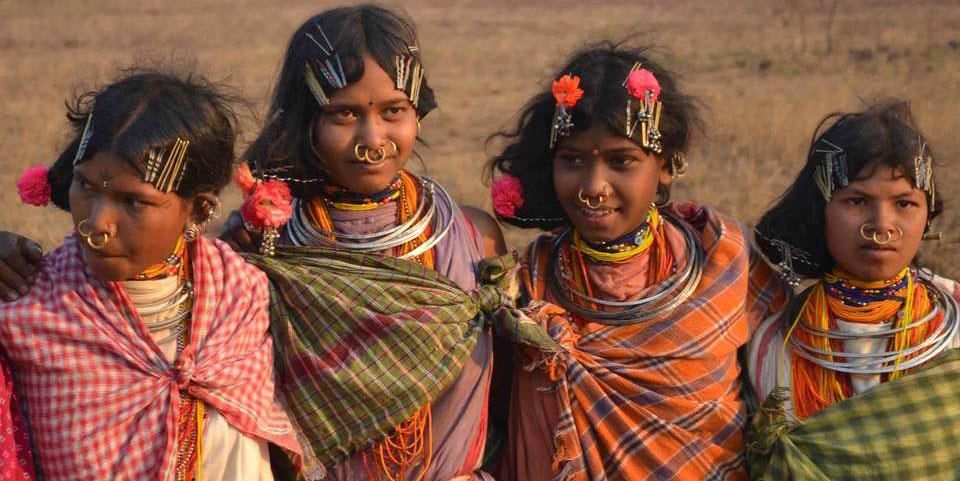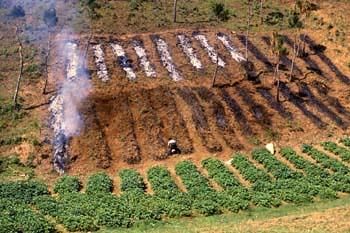NCERT Solutions for Class 8 History Chapter 4 - Tribals, Dikus and the Vision of a Golden Age
Let's Recall
Q1. Fill in the blanks:
(a) The British described the tribal people as __________.
(b) The method of sowing seeds in jhum cultivation is known as ___________.
(c) The tribal chiefs got _________ titles in central India under the British land settlements.
(d) Tribals went to work in the ___________ of Assam and the __________ in Bihar.
 Tribal PeopleAns:
Tribal PeopleAns:
(a) The British described the tribal people as wild and savage.
(b) The method of sowing seeds in jhum cultivation is known as broadcasting or scattering.
(c) The tribal chiefs got land titles in central India under the British land settlements.
(d) Tribals went to work in the tea plantations of Assam and the coal mines in Bihar.
Q2. State whether true or false:
(a) Jhum cultivators plough the land and sow seeds.
Ans: False
(b) Cocoons were bought from the Santhals and sold by the traders at five times the purchase price.
Ans: True
(c) Birsa urged his followers to purify themselves, give up drinking liquor and stop believing in witchcraft and sorcery.
Ans: True
(d) The British wanted to preserve the tribal way of life.
Ans: False
Let’s Discuss
Q3. What problems did shifting cultivators face under British rule?
Ans: The British government tried to settle people who practiced jhum or shifting cultivation for administration and economic reasons.
- However, this move to settle them into plough cultivation did not yield the expected benefits.
- The fields of these cultivators often produced poor yields, which means they did not grow enough crops.
- Additionally, new forest laws also affected the lives of these cultivators significantly.
 Jhum Cultivation
Jhum Cultivation
- Shifting or jhum cultivation is typically done on small patches of forest land. With the forest laws, the British took control of all forests and declared them state property.
- This restricted jhum cultivators from practicing their farming freely. As a result, many were forced to move to other areas in search of work and a livelihood.
Q4. How did the powers of tribal chiefs change under colonial rule?
Ans: Under colonial rule, the powers and roles of tribal chiefs changed significantly.
- Before the British arrived, these chiefs had economic power and controlled their territories. They could keep land titles over groups of villages and rent out land.
- However, they lost much of their administrative power and had to follow laws set by British officials.
- They also had to pay tribute to the British and manage tribal groups for them.
- As a result, they lost the authority they once held among their people and could no longer fulfill their traditional roles.
Q5. What accounts for the anger of the tribals against the dikus?
Ans: The word “dikus” means outsiders or who come from outside like – moneylenders, traders, zamindars, contractors, British etc. There are several reasons for the anger of the tribals against the dikus:
- The tribals practiced shifting cultivation, but the British forced them into settled agriculture and introduced land settlements.
- Traders and moneylenders entered the forests, offered low prices for forest produce, and lured the tribals into high-interest loans.
Many tribal people fell into this trap and remained in debt for life, viewing these outsiders as evil.
Under British rule, tribal chiefs lost their authority and could no longer fulfill their traditional roles; they had to pay tribute to the British. The new forest laws forced the tribals off their lands, making them homeless and pushing them to seek work elsewhere.
Q6. What was Birsa's vision of a golden age? Why do you think such a vision appealed to the people of the region?
Ans: Birsa's vision of a golden age :
- Birsa envisioned a golden age, or satyug, where tribal people would live well, build embankments, tap natural springs, plant trees and orchards, and cultivate the land for a living.
- He dreamed of a time when tribals would not harm one another and would live honestly.
- In his vision, the reformed tribal society would be free of vices like alcohol, uncleanliness, witchcraft, and sorcery, as well as outside influences such as missionaries, Hindu landlords, moneylenders, traders, and Europeans.
- This idea appealed to the tribal people, as they saw these vices and external forces as the root causes of their suffering.
|
40 videos|88 docs|23 tests
|
FAQs on NCERT Solutions for Class 8 History Chapter 4 - Tribals, Dikus and the Vision of a Golden Age
| 1. Who were the tribals mentioned in the chapter "Tribals, Dikus and the Vision of a Golden Age"? |  |
| 2. What does the term 'Dikus' refer to in the context of the chapter? |  |
| 3. How did the arrival of the British affect the lives of the tribals? |  |
| 4. What was the vision of a 'Golden Age' for the tribals as discussed in the chapter? |  |
| 5. What role did tribal movements play in resisting the exploitation by Dikus? |  |






















